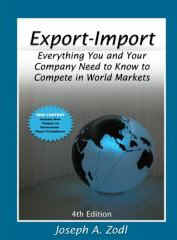
Selling to an Overseas Distributor
by
Joseph Zodl
© 2000 Joseph Zodl
(excerpted from remarks to National Association of State Development Agencies
Scottsdale, Arizona June 2, 1997)
There are a number of ways to bring a product into a foreign market: franchising, a joint venture, foreign direct investment (FDI), and export. Our focus is on export, that is, taking a U.S.-manufactured product and both selling and shipping to a foreign buyer. Sometimes a foreign buyer is the end consumer, sometimes it is a retail establishment.
Most often, it is a wholesaler in the foreign country whom we will call the "distributor." This means that this is a person who will purchase the product from us and re-sell in it the new marketplace.
Questions as to who will pay the international freight, who will arrange export clearance from the United States and who will be responsible for import clearance at destination are determined by the terms of sale negotiated between U.S. seller and non-U.S. buyer.
Typically, the seller will agree to undertake export clearance. Normally, he is responsible to the U.S. government that it was done correctly, and so should take control.
The buyer, or distributor will be usually be responsible for import clearance. And so we have the concept of each party undertaking the compliance requirements with his own government, and neither party responsible for the compliance with the other government. This tends to work out best.
In discussions with the foreign buyer, we want to constantly avoid the word "agent" as discussed in Export-Import. Naming a foreign wholesaler as our "distributor" is a better idea, although it is important to be careful in naming the party an "exclusive" distributor.
So our goal is a wholesale company in a foreign country which will undertake the import compliance part of the transaction, and promote the product through his own existing marketing network.
Focusing on the question of how to locate the wholesaler whom we will make our distributor, this takes up a whole chapter. The state departments of commerce are an immediate source for any company. Then, among the sources available to a U.S. manufacturer are:
1) Trade Shows. Here I mean both trade shows in foreign countries and trade shows in the United States. Many buyers from foreign countries visit U.S. trade shows. It's helpful to put up a sign that says "Foreign Distributors Wanted," and in a few different languages. It will help attract the buyers from other countries. Be careful in the sales literature so that international and not domestic terms of sale are used.
2) U.S. Department of Commerce. The Foreign Commercial Service has available programs that mirror many of the state programs, and also can provide trade leads and other services.
3) Chamber of Commerce. Many state and city chambers of commerce receive trade leads from foreign countries. Some publish the leads for their members, others make them available upon individual request.
4) Foreign Advertising. Advertising in trade journals in other countries will reach wholesalers in a specific business. There are trade journals for virtually every industry.
5) U.S. Advertising. We must emphasize also the effect of U.S. advertising because our trade journals reach many other countries. It's important to be sure that international leads are routed to the international marketing personnel and are not "lost" in a company's internal routings while a competitor makes the sale.
Many prospective distributors will have significant experience with introducing new imported products to their marketplaces. However, it is necessary for the U.S. company to provide backup from its own experience. Copies of past U.S. advertising campaigns, artwork, scripts, and other materials can be of great assistance to the distributor in establishing a market share for mutual benefit. It is not a cost to provide marketing assistance to the new distributor--it is an investment.
In the long run, international sales are made because there is a definite focus in a U.S. company to attract international buyers and devote the attention to international marketing that it requires.